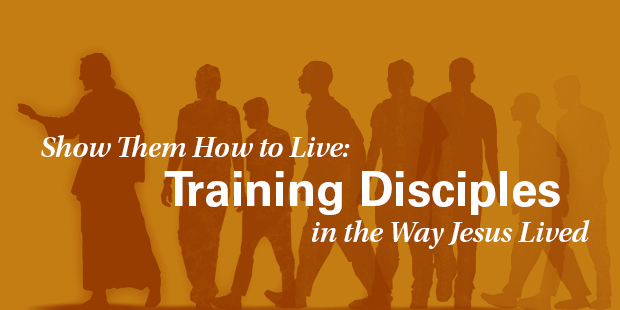
Show Them How to Live: Training Disciples in the Way Jesus Lived, Part 2
(continued from Part 1)
> The Bottom Line for Living Now
Here’s the bottom line: Jesus has called all who believe in Him to be His disciples. Our goal is to become like Him and represent Him in the world. Our identity is not defined by what we do but what He has done on our behalf. Our identity as a disciple does not turn on when we are in a “house of worship”. It is on all the time because “this is my Father’s world.”
Disciples of Jesus need a biblical metric for evaluating their lives, and church programs, activities, and events do not meet that standard. One of the roles I lead in during our gatherings is connecting with new people who attend for the first time. Occasionally, new people will ask the question, “What kind of programs do you offer? What kind of activities can we get involved in?” These are the questions of consumers from the culture of Christendom. Churches do them no service by giving them a way to be busy and yet experience no life change. Churches do themselves no favor by thinking they need to “sell their church” to such people. What these people need is to be taught how to live by a church who are committed to living out their identity as “a royal priesthood, a holy nation, a people for God’s own possession”.
When churches replace activities, programs, and events with gospel, community, and mission, the efficient system will be replaced with a glorious mess where Christ is in control, not the consumer. Instead of feeling the need to be the “best show” in town, churches are freed to offer the best grace of our beautiful Savior. Religious people in the system of Christendom know that it is a safe place to hide, a sure place of never truly being known. Disciples who live by repentance and faith have no fear of being known for who they truly are because they are living in the good of the gospel, not the shaky goodness of their religious checklist. For the church, we are not so concerned about disciples attending our stuff as much as we seeing them live their lives in the world around them. Let’s get rid of celebrating the props of religious performance and celebrate a life well lived through humble praxis!
> Show Them How to Live
I am convinced that most churches are missing the point at the most fundamental level of Christian living. For most of my life, I was never taught how to live as a disciple of Jesus. Perhaps that is because no one else around me was taught that either. We just did what everyone else did, and got busy at it. But it does not have to be this way! Christians learn to live by living out their lives in light of the gospel with a gospel community on mission in the world around them. Enough with teaching Christians how to act as Christians on Sunday. We need a view of disciple-making that trains Christians how to walk “in his steps” wherever and whenever that journey takes them.
Consider the questions that are being asked, especially about what is not being asked or talked about. How much of our lives are “off the table” because we have divorced everyday living from our identity as a disciple of Jesus? Consider the content of Christian conversation, especially if people are talking about how they are discovering new areas in their lives that are being brought under the Lordship of Jesus Christ as they grow in repentance and faith. Consider the subject of people’s prayer requests, especially if they are about matters tangential at best to their life, relationships, and involvement in the world. And consider what followers of Jesus are satisfied with, especially if they are more comfortable with being a consumer of religious activities than a disciples consumed with Jesus.
There are teenagers right now in your life who need to know how to live in a world full of temptation, peer pressure, and acceptance. There are young professionals in your life who need to know how to live in a world telling them life is about making a living, being successful, and moving up the ladder. There are young families in your life who need to know how to raise their children not to be Pharisees but disciplined and trained in a gospel-formative way. I could go on. But this kind of living does not get accessed by taking the pill or checking in once a week on Sunday. They need to be shown how to live by people who are living it out. It’s messy. It’s hard. But it’s glorious. Jesus came that we might have life, and that we might have it in full (John 10:10). Let us teach disciples to know what that means and live that out!
Read Part 1.
Read more from Timmy here.

Tags: Disciples, Discipleship, Timmy Brister











